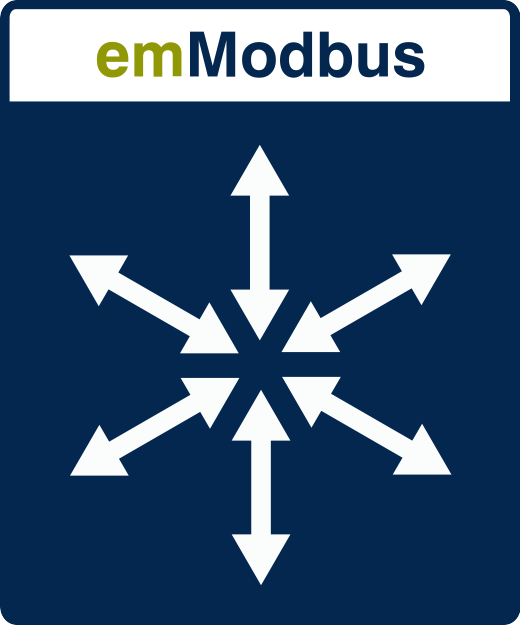
SEGGER emModbus
Modbus
Modbus is an open, mature, and straight forward communications protocol. It was originally published in 1979 by Modicon (Schneider Electric) and has since evolved into a standard communications protocol for industrial electronic devices.
Modbus was specifically designed to be used in supervisory control and data acquisition systems, connecting a supervisory computer with several remote terminal units (RTU). It therefore uses a master-slave-technique in which one device, the master, initiates transactions (called queries). Other devices, the slaves, respond by performing the action requested in the query and/or by supplying the requested data to the master.
See Wikipedia for further information.emModbus
emModbus, SEGGER's implementation of the Modbus protocol, supports communication via UART (ASCII, RTU) and Ethernet (Modbus/TCP and Modbus/UDP) and is capable to communicate with any Modbus compliant device.
emModbus supports building master and slave devices, which can even be combined in the same product. Also, multiple interfaces in the same product are supported. Each interface can be configured at runtime, making it possible to build a pretested library to be deployed in multiple projects.
Features
- Easy to integrate.
- Low memory footprint.
- ANSI-C code is completely portable and runs on any target.
- Follows the SEGGER coding standards: Efficient and compact, yet easy to read, understand & debug.
- Supports ASCII, RTU and Modbus/TCP (and UDP) protocol.
- Sample applications for all protocols included.
- Kernel abstraction layer: can be used with or without any RTOS.
- Works out-of-the-box with embOS.
- Modbus/TCP can be used with standard socket interface and any TCP/IP stack.
- Works out-of-the-box with embOS/IP.
- Project for executable on PC for Microsoft Visual Studio available.

Product information
Available shipments
SEGGER offers emModbus in two distinct shipments, both of which are optimized for use in embedded systems.
Requirements
TCP/IP stack
For usage of Modbus/TCP, emModbus requires a TCP/IP capable stack. emModbus can be used with any TCP/IP stack that supports BSD Standard Sockets.
Multi tasking
Although emModbus can be used completely without an RTOS it is recommended to use emModbus in a multi tasking system, at least when implementing a Modbus master.
Memory footprint
ROM usage
emModbus requires approximately 2.5 KBytes of ROM for a master device and approximately 3 KBytes of ROM for a slave device.
RAM usage
emModus requires approximately 30 Bytes of RAM for the stack itself and approximately 300 Bytes of RAM for each channel added.
Instruction set
emModbus currently supports the following instructions:
